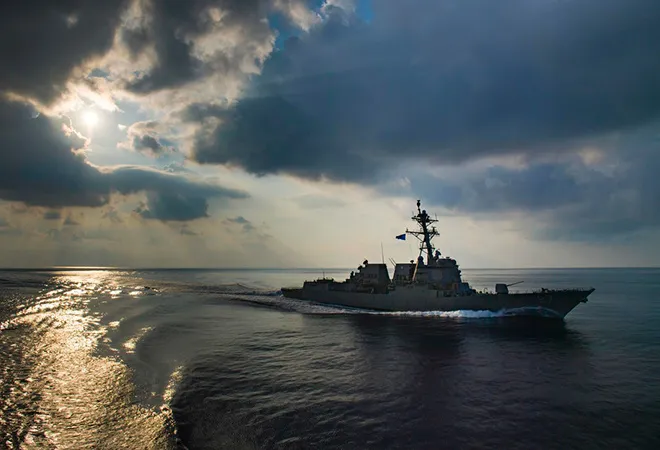
Recent years have witnessed the hitherto neglected and understudied dimension of maritime power acquire salience in academic and policy circles in India. Also, it is only in the last few years that Africa as a collective entity, has come to realise the importance of its maritime security and the potential of marine resources for fast-developing economies of India and African countries. Out of the 54 nations in Africa, 38 are either coastal or island states with vast coastlines - 18,950 nautical miles or 30,497 kilometres. Further, 90 percent of Africa’s trade is carried out through sea, making the African Maritime Domain (AMD) important for commercial, environmental, developmental, and security reasons. With a booming oil and mining industry, Africa has become the center of global attention, leading to a number of global players like India, China, France, Japan, and others to focus on Africa’s waters.
The Western Indian Ocean (WIO) region, according to Western Indian Ocean Marine Science Association (WIOMSA) is a region consisting of ten countries - Somalia, Kenya, Tanzania, Mozambique, South Africa, Comoros, Madagascar, Seychelles, Mauritius, and Reunion.
As an area of major global geo-strategic significance, the WIO remains a space of major geopolitical and naval interaction between states.
< style="color: #000000">Significant proportions of global maritime trade navigate through the area, including a large share of the world’s crude oil supplies. The region is also characterised by high biodiversity both in terms of species and ecosystems.
However, an increase in resource-extraction activities at sea has led to a corresponding rise in the rate of maritime crimes and sea traffic in the WIO. Most African countries, falling in the category of developing or least developed nation, lack the capacity to ensure the security of their declared maritime-zones. This has resulted in vast illegal capture and exploitation of marine resources, giving rise to a clamour for better maritime governance. Additionally, the high incidents of piracy off East African coast, in Gulf of Aden, has brought the issue of African maritime security to the world attention. India on its part is increasingly emphasising the need to increase maritime cooperation with WIO countries and African Island nations’ through offers of greater military aid, capacity building, and training assistance.
An ocean under threat
Most countries in the region have high population growth rates, and coastal development is expected to grow accordingly. The importance of ocean to the people of the region is immense, with over 60 million people inhabiting the coastal zones, and a quarter of these 60 million living within 100 kilometres of the shoreline.
The main drivers of growth in the WIO region countries’ rely on the extractive, construction, and service sectors including the tourism industry.
The natural assets of the WIO has been
conservatively estimated at $333.8 billion. Fisheries represent the largest asset of the WIO region, estimated at $135 billion, or 40 percent of the total natural assets. The Annual ‘Gross Marine Product (GMP)’ of the region is at least $20.8 billion.
However, like in other parts of Africa, the WIO littorals are at a turning point where rapid economic development and population growth will considerably increase pressures on the ocean assets which provides a source of livelihood and prosperity.
At a time when the use of ocean resources to support growth is increasing, we see the depletion and degradation of primary ocean assets due to exploitation of the resources from the pressure of the sheer size of the population of the littorals.
The
World Wildlife Fund reports (p. 27) that 35% of the fish stocks assessed in the WIO are fully exploited and 28% are over-exploited. “Kenya and Tanzania have lost about 18% of their mangroves over 25 years, and Mozambique lost 27% over a shorter timeframe.” Over 50% of the shark species assessed in the region are considered threatened. And 71-100% of the region’s coral reefs are at risk, with the exception of those in the Seychelles.
Through wise management, ocean assets can help lift countries out of poverty and achieve the Sustainable Development Goals (SDGs). However, unsustainable and unhealthy practices pose high threats to the ocean assets. Therefore, it is vital for countries in the WIO region to transform to economic practices that value and nurture the natural asset base of the WIO. The countries and its leaders need to demonstrate commitment on how to navigate towards a sustainable, inclusive blue economy.
The concept of Blue Economy was brought into the discourse with Gunter Pauli’s (2010) book,
The Blue Economy 10 years, 100 innovations, 100 million jobs. It mainly includes economic and trade activities that integrate the conservation and sustainable use and management of biodiversity, including maritime ecosystems and genetic resources. As the ten WIO littorals attract attention from global economic powers for the coastal access they provide into African hinterland, it provides for a significant opportunity for bringing Blue Economy to the forefront.
Within Africa, the African Union’s
Agenda 2063 lays special emphasis on the development of
Blue Economy for the continent’s growth. Similarly, AU’s
2050 Africa Integrated Maritime Strategy (AIMS) seeks “to foster more wealth creation from Africa’s oceans, seas, and inland waterways by developing a thriving maritime economy and realising the full potential of sea-based activities in an environmentally sustainable manner.”
African national Blue Economy initiatives
Three WIO region countries (Mauritius, South Africa, and Seychelles) have initiated their own version of blue print to sustainably manage shared ocean assets. Mauritius is first African country to develop a roadmap for Blue Economy in 2013. The
Maurice Ile Durable (MID) initiative, includes a participatory approach towards elaborating a national strategy towards sustainable development, by taking on-board the whole society in the implementation of the project. The initiative is based on five e-pillars; Economy and Employment, Energy, Environment, Education, and Equity.
South Africa’s blue economy model, labelled as
‘Operation Phakisa’ was launched in 2014 as a five-year long project. As a long-term goal, the project aims to move from coordinated sectoral environmental management to integrated environmental ocean management. Also, Seychelles on 31
st January 2018, launched the Blue Economy Strategic Framework, which articulates Seychelles’ ‘Blue Economy Brand’ as a unique comparative advantage, based on its sustainability credentials. A vital component of this initiative is the
‘debt-for-adaptation-swap’ which seeks to forgive part of Seychelles’ national debt in exchange for strictly protecting 30% of the EEZ to support climate adaptation.
Pull factor drawing India closer to WIO region
From a geo-strategic and geo-economic point of view, the WIO holds immense value and provides numerous opportunities for countries in the region. The discovery of vast array of natural resources in seabed mining, deep-sea excavations, rare earth materials, oil plants, and large deposits of natural gas, in the WIO region’s ten countries has been a strong pull factor, drawing India and WIO countries in joint undertakings. Various Indian private players continues to invest in diverse along with increased cooperation in extractive resources sector.
For India, using multilateral engagement forums like IORA and IONS, to make the WIO region secure and socio-economically well-managed is vital in order to ensure that the India Ocean littorals are not exploited for their resources or for their geo-locational relevance in a matter prejudicial to India’s economic or security interests.
If India is serious about positioning Blue Economy as its central theme in its diplomatic outreach to the WIO region, it has to go beyond the rhetoric associated with summit announcements and media briefings.
Given India’s strong diplomatic, cultural, and kinship ties with East African nations, India can leverage its ambassadors in WIO countries to formulate a cooperative framework that outlines clear steps to reduce trade imbalances. India can apply innovative Blue Economy principles to provide ‘Triple A’ (appropriate, affordable, adaptable) technology in WIO in areas of water reuse, wastewater recycling, salt water to fresh water conversion, marine-based renewable energy production, including wave and tidal energy, and management of health of the ocean environment for nutrient rich food sources in a rapidly urbanising coastal scenario.
In terms of forging maritime partnerships with WIO region littorals, India has shown a strong commitment for proving security in its near maritime zones.
India’s engagement has expanded and diversified into a broad-based security approach, one which is supplemented by regular shipping visits, sharing of best practices to build capacity through training, transfer of naval hardware and logistical support, naval intelligence, joint military exercise and patrolling of EEZs, and development of listening posts and stations.
Blue Economy provides for significant opportunities for cooperation. African Union has declared it as the “frontline of Africa’s renaissance” and also PM Modi has referred to the Blue Chakra or Wheel in Indian National Flag as representing the potential of Blue economy. Subsequently, in the
2015 Delhi Declaration, both India and Africa reiterated their desire to cooperate on the development of Blue economy.
India can no longer afford to ignore the WIO region. The WIO region’s geographical proximity and its rich natural resources, provides India with a great opportunity to increase its maritime security cooperation with African countries. In future, India not only requires to assist Africa with hard capacity to undertake relevant security tasks, but also needs to play a vital role in the evolution of a comprehensive continental strategy which can improve the lives of African people by creating a model of sustainable maritime development.
The views expressed above belong to the author(s). ORF research and analyses now available on Telegram! Click here to access our curated content — blogs, longforms and interviews.



 Recent years have witnessed the hitherto neglected and understudied dimension of maritime power acquire salience in academic and policy circles in India. Also, it is only in the last few years that Africa as a collective entity, has come to realise the importance of its maritime security and the potential of marine resources for fast-developing economies of India and African countries. Out of the 54 nations in Africa, 38 are either coastal or island states with vast coastlines - 18,950 nautical miles or 30,497 kilometres. Further, 90 percent of Africa’s trade is carried out through sea, making the African Maritime Domain (AMD) important for commercial, environmental, developmental, and security reasons. With a booming oil and mining industry, Africa has become the center of global attention, leading to a number of global players like India, China, France, Japan, and others to focus on Africa’s waters.
The Western Indian Ocean (WIO) region, according to Western Indian Ocean Marine Science Association (WIOMSA) is a region consisting of ten countries - Somalia, Kenya, Tanzania, Mozambique, South Africa, Comoros, Madagascar, Seychelles, Mauritius, and Reunion.
Recent years have witnessed the hitherto neglected and understudied dimension of maritime power acquire salience in academic and policy circles in India. Also, it is only in the last few years that Africa as a collective entity, has come to realise the importance of its maritime security and the potential of marine resources for fast-developing economies of India and African countries. Out of the 54 nations in Africa, 38 are either coastal or island states with vast coastlines - 18,950 nautical miles or 30,497 kilometres. Further, 90 percent of Africa’s trade is carried out through sea, making the African Maritime Domain (AMD) important for commercial, environmental, developmental, and security reasons. With a booming oil and mining industry, Africa has become the center of global attention, leading to a number of global players like India, China, France, Japan, and others to focus on Africa’s waters.
The Western Indian Ocean (WIO) region, according to Western Indian Ocean Marine Science Association (WIOMSA) is a region consisting of ten countries - Somalia, Kenya, Tanzania, Mozambique, South Africa, Comoros, Madagascar, Seychelles, Mauritius, and Reunion.
 PREV
PREV



